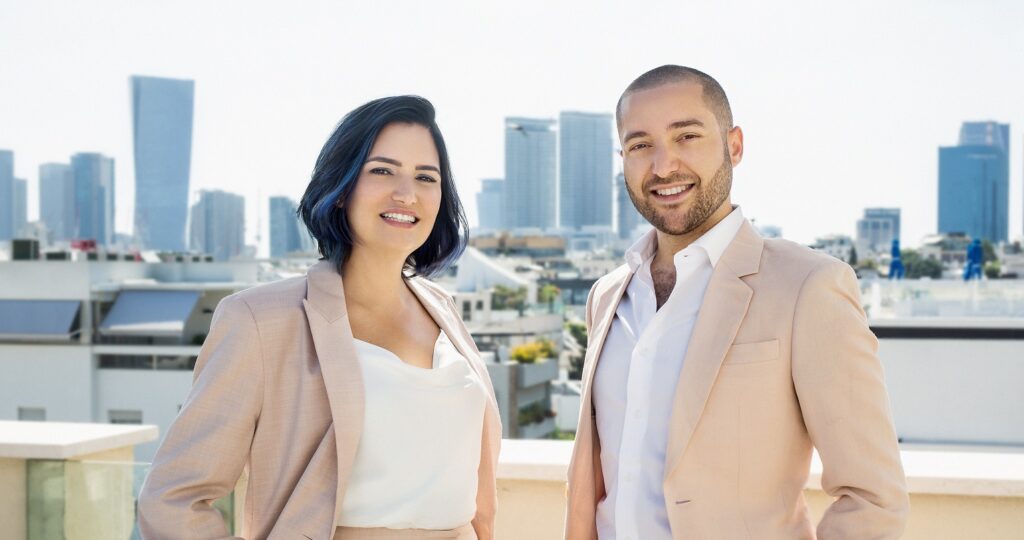As the Israeli tech and innovation ecosystem matured over the past decade, transitioning from a Startup Nation to a Scale-Up Nation, Israeli founders have come to consistently smash funding records, even during a global pandemic, and draw millions in capital from big-name international investors, growing their companies to become unicorns, or taking them public on capital markets via IPOs or SPAC mergers.
The larger focus in the investment industry, in general, has been on late-stage startups and companies in recent years with seed and early-stage outfits increasingly feeling the crunch. But this is exactly where Meron Capital, a relatively new VC firm in Israel, sees exceptional opportunity.
Founded in 2017 by young entrepreneurs Liron Azrielant and Daniel Roditi, Meron Capital has made seed and early-stage startups the focal point of its investment strategy with a special emphasis on founders themselves.
“You work with these founders and it’s about all this potential, this point of inception, it’s about what the business could be [some day],” Azrielant tells NoCamels during an interview at Meron Capital’s loft-like offices in Tel Aviv late last month.
“It’s not even about market size. The market size of Facebook was zero when it started. Zero was the amount of money people were willing to spend on social networks. Or Maybe MySpace, because Facebook wasn’t technically the first,” she says.
Meron Capital recently announced the launch of a new $50 million fund, Meron II, focused on early-stage deep tech startups led by Israeli entrepreneurs. The fund has already invested in four companies; LendAI, a startup operating in the market of mortgage lending, where Meron was joined by Israel’s third-largest bank, Discount Capital; Sorbet, a PTO (paid time off) clearinghouse, in a deal together with Viola Ventures; Firmbase, a fintech startup also backed by top angel investors; and Laminar, a data protection platform for cloud-native applications, where Meron invested alongside TLV Partners and Insight Partners.
SEE ALSO: Sorbet Raises $21M To Help Employees Turn Paid Time Off Into Cash
Having spent a number of years in the US, first in Boston as a student at MIT, then in Atlanta earning her chops in the private equity world with Bain & Company, and finally in New York working at PricewaterhouseCoopers (PwC) in post-merger acquisitions, Azrielant knew the venture capital (VC) industry was her calling. She moved back to Israel, her home, taking up a position with Blumberg Capital in Tel Aviv where she met Roditi, before the pair branched out on their own with Meron.
“In the VC world, you bring your whole self to your work. You’re maintaining a really strong network of connections, you’re helping people get what they want, that is my job,” she explains.
Every one of these multi-million or multi-billion dollar companies started somewhere, Azrielant explains. And that’s where Meron Capital wants to start.
“For me, it is 100 percent the obvious move, because if I were to bet on what everybody else is betting on…as a newcomer, I would have to wait in line. But if I do what I do best — what I and my partner do best — and that is, identify early-stage talent, and we can get them before the hype, then we can enjoy the hype,” she tells NoCamels.
“For us, it makes a lot more sense this way,” Azrielant explains, adding that all four startups Meron Capital has invested in are already steadily showing signs of growth.
Here is our full interview with Azrielant where she talks about the Israeli tech industry as a whole, what it takes to be a good VC, and what Meron Capital looks for before going in on an investment. Her answers have been edited for length and clarity.
NoCamels: There’s been a lot of money pouring into Israeli tech companies in recent years, and a lot of activity in capital markets. What is your sense of what is happening, good and bad?
Azrielant: The good part is that the ecosystem is maturing. We’ve learned how to build companies and not just tech products. Like [Israeli endpoint security firm] SentinelOne is a company, it’s not a product to be acquired by CheckPoint or Palo Alto Networks or Cisco or IBM. [SentinelOne completed an IPO on the NYSE in June at a valuation of $9 billion].
So, Israeli entrepreneurs are building companies that could stand there on their own. It used to be the case that we had the best AI researchers, the best developers, the best infrastructure people, but we didn’t have [many] product people. Now we do. We didn’t have that many salespeople. We still don’t, but it’s getting better.
NoCamels: Why is product management such a key role?
Azrielant: There are companies that would rise and fall on whether their product is the best. It was often the case that the playbook for a top Israeli company would be to [develop] something ugly but with top technology. And that makes sense if you’re hoping to exit at $100-$300 million. Because to build something that could be added to a large company or corporation, you don’t really need the product to be at the top.

But right now, Israelis are trying to build large companies, they’re not just building technology anymore. They’re building products. That’s a huge differentiator for a company.
I still think that Israel’s edge, its competitive advantage is around tech. But if you assume that you’re selling tech and you let the tech just try to sell itself or stand on its own, you’re very much bounded from above in terms of how good the company that you’re building is going to be.
The aesthetics are one part of it. The other is usability.
So for example, let’s take [our portfolio company] Firmbase, which is building a tool for financial planning and analysis managers. It would be relatively easy to build a product that is as good as homegrown, which means if the founder gives you like an hour of training on the product, ‘you do this, you do that,’ — you understand it, but it’s still not intuitive for you. That too could sell, it just can’t sell at scale because the founder only has that many hours in a day.
It takes a brilliant product manager to build a tool that is so complex — because financial planning and analysis is one of the most complex parts of the business — [and still be intuitive]. It is a great example of a company that really needs solid tech, but would not succeed unless all that the tech is combined with a brilliant product.
Because then they can’t scale, they can’t gain usability and become better than existing competitors.
NoCamels: Can you give us your best examples of the differences between a certain technology and a product?
Azrielant: Let’s look at endpoint security in the cybersphere. You could have the ugliest thing you’ve ever seen installed on your computer. And every time that there’s a virus, it sends you an alert. But it doesn’t impact the performance of your computer in the slightest, and it catches all potential viruses. This is an example of a product that doesn’t really need to be…let’s say, it would be nice if it’s pretty but the main customer need is very much based on technology.
Now let’s look at [Israeli-founded video chat app] Houseparty or Snapchat. Those are products that completely rise and fall on being products. Endpoint security is 100 percent tech. With Spanchat, those filters do require some tech, but as long as it’s good enough and it works, no one’s really going to care.
So it’s user experience and usability. Sometimes usability is about not even having an interface at all.
Sign up for our free weekly newsletter
SubscribeWe [Israelis] are still very much driven toward tech. If you think of all the consumer apps, almost none of them — that succeeded — were started in Israel. This lack of product skills used to create this sort of barrier for a lot of the companies.
And that’s just no longer the case.
NoCamels: Investing in early-stage requires taking a lot of risks and, as you said, there’s also lots of potential when founders are putting all of their energies towards building something. What do you look for when meeting entrepreneurs?
Azrielant: We look for grit and maven-ness. Those are the top two for us.
We’ve looked at our past investments and we’ve noticed that the biggest correlation between those [startups] that succeeded and those that didn’t were whether the management team, the CEO specifically, was resilient.
Also resourcefulness. This whole ‘they closed the door, so come in through the window’ type of thing.
We love founders and we don’t focus too much on traction. Come to me and say, ‘what kind of traction do you expect the company to have when raising funds,’ and the answer is always zero. I don’t need you to have clients. I expect the founder to understand their business through and through and understand who’s the buying persona.
The real goal is understanding. What’s the problem you’re solving? What’s the real value of your business and how are going to market that to your users? To me, that matters the most.
If I talk to a founder and I feel like they understand their business much, much more than I ever could, then I know I want to work with them.
NoCamels: Do you think, with your experience and your background, that you would make a good founder?
Azrielant: That’s a really good question. Dani and I founded Meron Capital and we are doing very well. [We think about things like] what we still need to learn, who could teach us, and asking the right people for help, getting the right people on our side, getting the right partner.
NoCamels: So what makes a good VC? Are you good VCs?
Azrielant: A VC fund does three things: access companies — find companies that they want to potentially invest in — choose the companies, and grow the companies.
In today’s climate, when there’s too much money, access tends to matter a lot more than selection. And if you break down access, that has to do with reputation. And grit, because reputation helps you with inbound and grit and helps you with outbound.

Being a newcomer has meant that we needed to build our reputation…and looking at how many top founders, who have options, seek us out specifically, I think we did amazing work in how fast we built this reputation for ourselves.
We still reach out and develop those relationships with founders, we find really unique and proprietary deal flow. We don’t meet companies just when they’ve already decided to fundraise, we meet them before and we are able to create a relationship. And that gives us more information when we need to decide [to invest].
We’re still small and we’re still developing our platform, but, for example, we’ve had four exits out of the 16 investments we made out of Meron I.
NoCamels: The VC industry here is very developed. There are other VC companies doing early stage. Why would a founder choose Meron Capital?
Azrielant: Great question. First, what we’re selling is ourselves and the relationship with us. We invest in people that we believe in and trust. To be clear, what that means is that if I think a founder is making a really, really bad decision, and I’ve talked to him/her and s/he heard me out, I’m going to remind myself to trust him/her to run the business.
We work really hard for our founders. If they don’t need help, we let them do their thing, but if they do — like if they got an inbound acquisition offer or they want to manage a process with an investor or hire a VP — we’ll go sleepless to make sure that we get them what they need.
NoCamels: As newcomers, how differently do you view the landscape here? You’re both in your late 20s, early 30s, what do you bring to the table that’s different?
Azrielant: It’s easier for us to work with founders at eye level because we understand [the process]. In a lot of ways, we invest in people that are kind of like us.
We’re a startup ourselves, so we understand it because we’re going through it; working to find a competitive advantage, hiring the first employee, doing all these things that we’re living through right now. It’s like we are walking the same path as the founders. Just like they are building their business, we’re building ours too. And we can’t afford to not work hard.
NoCamels: Apologies for the tired interview-like question, but where do you see Meron Capital in five years?
Azrielant: Right here, with more companies and more exits. It’s a key differentiator for us. We love early stage. We love managing small funds. The reason people don’t stay in the early stage is because they start raising larger and larger funds. We get to work really hard and really personally with all our founders. And in five years, I just want to have more funds under my belt.
So I guess we’ll be raising a Meron IV fund in five years.
Related posts

Editors’ & Readers’ Choice: 10 Favorite NoCamels Articles

Forward Facing: What Does The Future Hold For Israeli High-Tech?

Impact Innovation: Israeli Startups That Could Shape Our Future




Facebook comments